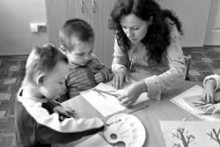It is always a surprise for experts who work with children with Down’s syndrome to observe that these children are so gentle, patient, and inoffensive. Doctors even recommend that healthy children communicate with them in order to foster similar character traits. Debora Taylor, the wife of the US ambassador to Ukraine, says that when she was working in an office in Washington in the 1980s, her company decided to hire several people with “genetic accidents.” “They delivered the mail and made coffee for us,” Mrs. Taylor explained. “It was very beneficial for them to communicate with us, work, and help people. But the most unexpected thing for us was that our office life became more harmonious when the employees communicated with them: the people with Down’s syndrome were teaching us to be gentle and kind. But it is much better to have such an experience in childhood.”
EXTRAORDINARY CHILDREN
The children attending Kyiv Kindergartens No. 662 and 291 will now be exposed to the experience of helping children weaker than themselves and explaining things to them. Special mixed groups of healthy children and children with special needs studying together have been opened as part of the Special Idea Social Charity Program. This is the first example in Ukraine of inclusion in the sphere of pre-school education. It is the brainchild of the staff of the Svit Sim’i Center of Child and Family Psychology, particularly its head Valeria Kuks.
“These children used to visit our early assistance center. We started to work with them when they were very small: 10 or 11 months,” she explained, “Psychologists, defectologists, and speech therapists worked with these children. The program led to wonderful results. We were looking for systems of methods; we studied them, and then went to Moscow for additional experience. When we completed this work, we realized that there is crucial need to assist the further development of these children: they are growing up; we are developing and socializing them, so we must do something more with this. That’s when we decided to send them to be educated in kindergartens.”
According to this program, Kindergarten No. 662 has taken 13 children with Down’s syndrome. Some of them attend the entire week while others come only for a few days. At first, the children spend only a couple of hours to get accustomed and lose their fear of new people and the different atmosphere. With regard to the interior, the sponsors of the Svit Sim’i Program have done their best: they made repairs and bought toys, furniture, dishes, and school equipment: everything is new and smells like a new house.
“These children resemble healthy ones a lot: some cry, others want their mothers, some adapt quicker, others — later,” correctional pedagogue Olha Skoryk explained. “Like any person, they have their own level that we are trying to develop. It is more difficult for them to learn to communicate, but they all have possibilities to do this. All these children differ from each other: we have three children with Down’s syndrome in our group and all of them need an individual approach.”
EXTRAORDINARY CHILDREN — EXTRAORDINARY FAMILIES
Unfortunately, Down’s syndrome is more than a question of being intellectually challenged. Experts say that these children are born with serious health problems. Sometimes they need a heart operation in the first days of their life. Down’s syndrome children often have gastrointestinal disorders, poor eyesight, and other disabilities. So it is hard to raise them, both physically and psychologically.
“I am a pediatrician and I remember well what kind of shock it was for a mother to give birth to a child with Down’s syndrome. This was also a shock for the father,” says Dr. Vira Pavliuk, head of the Medical Supply Department at the Hospital of the Future Program funded by the charitable foundation Ukraina-3000. “As far as I remember, men could not endure this test and left their wives alone with the child. Unfortunately, the same thing is happening today. So in order to help these families, I am thinking about creating a center at the Hospital of the Future, which would also help these children socialize.”
Socialization is the most crucial assistance that inclusive groups in kindergartens and schools can offer to children with Down’s syndrome. After graduating from an educational institution, such a child will be ready (as far as possible) to live in society and will not need to be taught about life, as is the case with children who graduate from a specialized boarding school. Experts maintain that boarding school graduates never adapt to life and remain almost completely isolated from the world. There are many children like this: about 27 babies are born in Kyiv each year and over 300 all over Ukraine.
SPECIAL SCHOOLS ARE NEEDED
In three or four years the parents of children with Down’s syndrome who have begun attending kindergartens will start thinking about their further education. So the program’s next step will be to open inclusive classes in schools. Oksana Dobrovolska, the head of Education Management and of Kyiv’s Obolon district, says that her district has the most experience in creating conditions for educating children with special needs.
“This project is a continuation of the Capital Education and Extraordinary Child projects and the Program of Integrated Teaching of Children in Non-Specialized Schools,” she explained. “We have ‘occupied’ four kindergartens in 2007, and 128 children with infantile cerebral palsy are already studying in the lower grades of School No. 168. Therefore, I am convinced that inclusion of children with Down’s syndrome will be the next stage of our work.” In the opinion of experts, inclusion in schools is not a utopia because in the US and Europe nearly 75 percent of children with Down’s syndrome study together with their healthy peers. Therefore, Kyiv specialists are convinced that these two signs are only the beginning of a nationwide program in the framework of which similar groups will be opened in our state.
“If these children attend an ordinary kindergarten and an ordinary school afterwards (nearly three-quarters are capable of this), these will be the first steps toward socialization, which will enable children with this syndrome to feel equal to other children,” said Volodymyr Vovk, deputy head of the State Social Service for Families, Children, and Youth. “When the child is 18, s/he will be able to start an independent life in a more confident way and find a job, and parents will not lose their faith in their offspring.”
COMMENTARY
Dr. Vira HALAHAN, director of the UDSL OKhMADYT Medical-Genetic Center, geneticist:
“Down’s syndrome is a chromosome pathology denoted by the presence of an extra chromosome in the male’s cells. This is the reason behind the child’s physiological peculiarities. We have a system of prenatal diagnosis in Ukraine, which allows us to tell the mother whether her child has a defect. Down’s syndrome is diagnosed in the prenatal period starting from the 9th or 10th week of gestation, if the woman has seen a geneticist in time and undergone diagnostics. Such programs are in place in every region of the country. The rate of children born with such a diagnosis is 1.8 percent for every thousand newborns. If a child is diagnosed with Down’s syndrome, a woman has the right to terminate the pregnancy before the 22nd week.
“Our center offers regular medical check-ups for pregnant women and medical rehabilitation for children with congenital pathologies. Beside diagnoses, family consultations, and risk estimates, we also give recommendations concerning treatment.”








